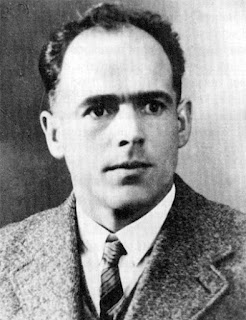Many people know about Claus Von Stauffenberg, the German officer who led an unsuccessful plot to kill Adolf Hitler in 1944.
After the attempt failed, he and other plotters, including theologian Dietrich Bonhoeffer, were arrested and executed.
Some know about Sophie and Hans Scholl, two German university students who were motivated by their Roman Catholic beliefs to oppose the Nazis regime.
Together with some other university students, they created the White Rose movement, publishing leaflets expressing their opposition to the regime.
They were arrested by the Gestapo and executed in 1943, along with four other members of the group.
We know about these people because of the many movies, books and documentaries that have been made (including the 2008 movie Valkyrie, with its controversial selection of actor Tom Cruise to play Von Stauffenberg.)
But scant attention has been paid to Franz Jägerstätter. But with a new movie about him by Terrance Malick coming out in December, that should change.
Jägerstätter, who was born in 1907, was an Austrian Roman Catholic who found Nazism incompatible with his Catholic faith. When he was called up to military service in 1943, he declared himself a conscientious objector—despite being warned by friends that he was throwing his life away.
As they predicted, he was arrested and thrown in prison. But he was undeterred.
From his cell, he wrote: “I can easily see that anyone who refuses to acknowledge the Nazi Folk community, and is also unwilling to comply with all the demands of its leaders, will thereby forfeit the rights and privileges offered by that nation.”
But, he went on to say, “it is not much different with God: He who does not obey all the commandments set forth by him and his Church, and who is not ready to undergo sacrifices and to fight for his kingdom either—such one loses every claim and every right under that kingdom.”
Anyone could be both a Nazi and a Christian, he added, “would be a great magician . . . I, for one, cannot do so. And I definitely prefer to relinquish my rights under the Third Reich and thus make sure of deserving the rights granted under the kingdom of God.”
On August 9, 1943, Jägerstätter was executed—beheaded—leaving behind a wife and three children. He was 36 years-old.
In June, 2007, the Vatican declared him a martyr. On October 26 that same year he was beatified in Linz, Austria. His feast day is May 21.
Jägerstätter's comments, written from his prison cell long ago, still speak to people today about the need to take stands against repressive and tyrannical governments—and their wars.
“Just as the man who thinks only of this world does everything possible to make life here easier and better, so must we, too, who believe in the eternal Kingdom, risk everything in order to receive a great reward there,” he wrote.
"Just as those who believe in National Socialism tell themselves that their struggle is for survival, so must we, too, convince ourselves that our struggle is for the eternal Kingdom. But with this difference: We need no rifles or pistols for our battle, but instead, spiritual weapons—and the foremost among these is prayer.”
More
information about A Hidden Life, Terrance Malick’s movie about Franz
Jägerstätter can be found here.
